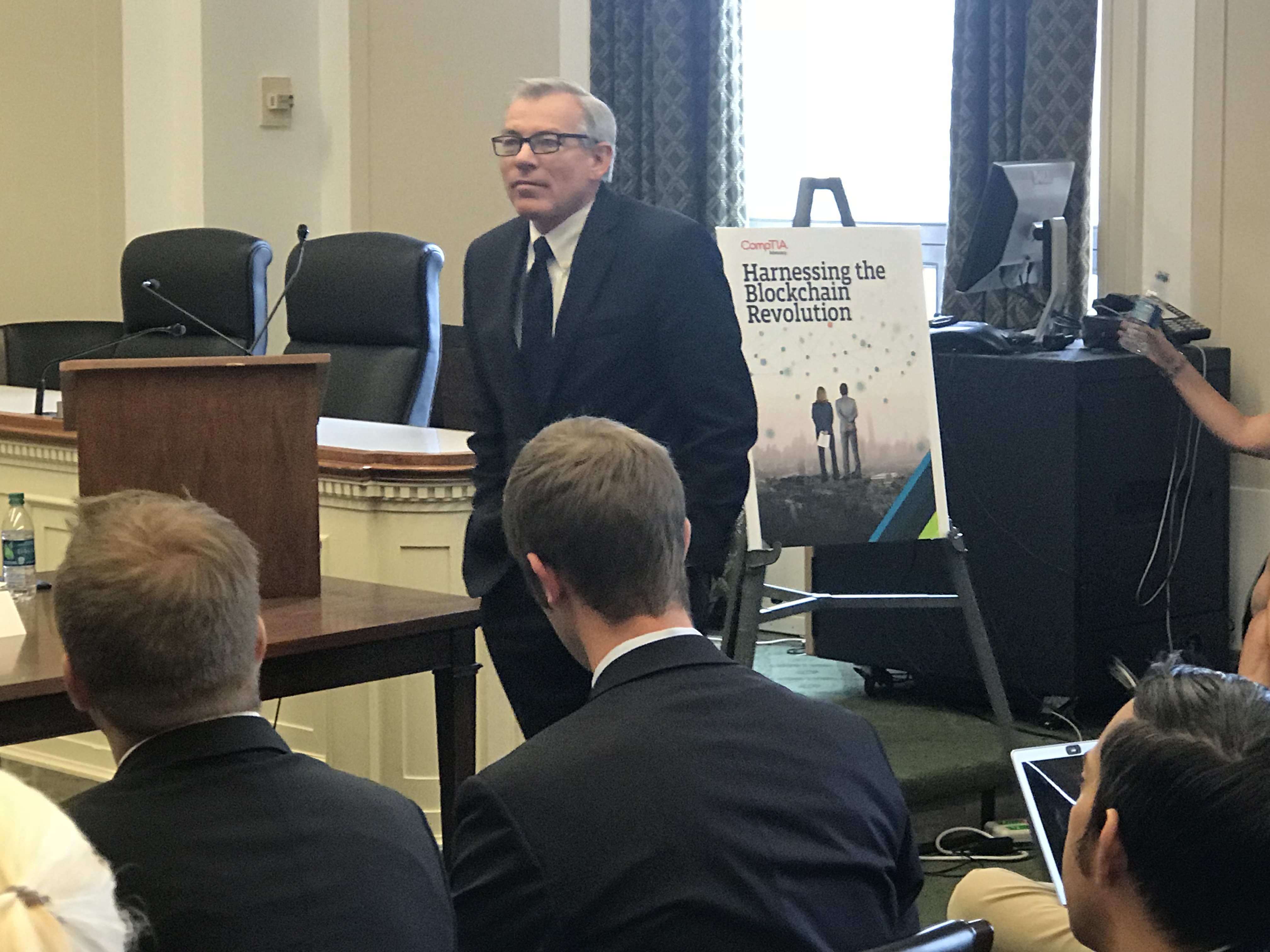This week, CompTIA Advocacy hosted a panel session on Capitol Hill titled ‘Harnessing the Blockchain Revolution.’ Blockchain technology is at a tipping point, as the wide range of opportunities are constantly growing. Moving forward, it is crucial to demystify blockchain technology and provide information and tools to fully evaluate whether blockchain might be the solution to support essential government and public sector functions in an efficient, secure and transparent way. 
Elizabeth Hyman, the Executive Vice President of CompTIA Advocacy, opened the blockchain discussion with some remarks, and announced the release of CompTIA’s own Blockchain Guide, which can be found here.
Hyman also highlighted some important stats regarding the vast expansion of blockchain. Gartner recently estimated the business value of blockchain to grow to $176 billion by 2025, and more than $3 trillion by 2030. Many businesses have seen the important value that blockchain technology offers. A May 2018 Deloitte survey of corporate executives around the world found that 74 percent see a “compelling business case” for the use of blockchain; 34 percent reported that their company has already begun work on blockchain systems; and another 41 percent said that they expect to deploy a blockchain application with the next year.
To close, Hyman discussed two CompTIA policy recommendations moving forward. First, Congress should create a working group of federal stakeholders to provide recommendations for planning and encouraging the growth of blockchain technology. And second, the federal government and state governments should consider creating a blockchain and emerging technology “regulatory sandbox.” This can make it possible to achieve a balance between the fast-paced innovation that typifies blockchain and the need for a risk-free development environment.
We then heard from David Logsdon, the Senior Director of New and Emerging Technologies at CompTIA Advocacy, who moderated and introduced the panel. The panel included Breck DeWitt, the North American CTO and Director of Infrastructure Solutions for the Government and Education Sectors at Dell EMC; Pete Teigen, The North American Lead for Blockchain, Mobile, and Emerging tech at IBM Services; Joel Waterfield, the Managing Director of State and Local Tax Practice at Grant Thornton; and Kim Augustine, a Manager in Deloitte’s Government and Public Services Practice.
Beginning the questioning, Logsdon asked the panel about their policy recommendations for the remainder of 2018 and into 2019. In response, the panelists agreed that there is a need to educate and re-educate policymakers. It is necessary to emphasize that there are numerous applications of blockchain, far more than just bitcoin. Additionally, Teigen highlighted the importance of standardization moving forward; policies should focus on streamlining a standard language and understanding of the technology.
Additionally, as the technology evolves and makes strides in several industries, it is important to foster innovation and experimentation. Dewitt recommended holding “chain-a-thons” to showcase talent and encourage safe spaces for innovation. He said that the best way to understand how the technology works is to “learn from broken systems.” It is critical that blockchain developers feel that there is room for failure, as errors are vital in understanding blockchain. Augustine added to this, noting that policies should adapt to allow for and incentivize innovation.
Logsdon next asked the panel about the likely timeframe of rolling out and scaling up blockchain technology. Waterfield noted that within the next 12 months, it is likely that we will only get to see lower level solutions come to fruition using blockchain. This trend will continue to grow, but we aren’t at a stage yet where these developments can move that fast. Augustine also discussed how technology compliance will impact a blockchain rollout. Organizations must ask themselves, ‘Are there compliance issues,’ and ‘should we partner with other organizations to roll out a blockchain solution?’ Policies will have to be aligned with the evolution of blockchain.
Logsdon then turned to the audience for additional questions. One member of the audience asked, “what makes blockchain preferable to the government over other alternatives?’ DeWitt and Augustine both spoke about the data protection perspective which makes blockchain such an important technology. Augustine further noted that blockchain provides a more efficient way to integrate with other companies through streamlining ownership of data. Some of the applications of blockchain include credential management for driver’s licenses, easy access to personal records such as healthcare or taxes, identity management, and more. DeWitt added, “blockchain will help solidify trust in a digital economy … blockchain moves us a step in the right direction.”
And finally, Logsdon ended the panel discussion with a question on blockchain’s impact on the workforce. Teigen noted that blockchain has created thousands of new roles and jobs; companies need blockchain developers to take on this emerging tech. DeWitt and Waterfield added to this, explaining that we will see an increase in jobs of a new kind and current roles will be changing to adapt to the growth of blockchain.
To close the event, Congressman David Schweikert (R-AZ), the co-chair of the Congressional Blockchain Caucus, enthusiastically addressed the audience on the seemingly limitless applications of blockchain technology, and how it can drastically increase efficiency in the future.
“Information is the God of making society safer,” he stated. For example, through increasing access to living data, blockchain technology can help researchers access a world of deidentified data on medical records to develop treatments and cures.
Congressman Schweikert also emphasized that policymakers have an important role in the success of blockchain; by enabling a receptive legal framework and making sure blockchain applications are not impeded by obsolete laws and regulations, blockchain technology can thrive in the near future.
“This is a revolution,” he said. “We need to blow up the mindset around here.” Congressman Schweikert passionately indicated just how important blockchain technology will be moving forward. And to get blockchain to its full potential, we will certainly need policymakers to be working side by side with those revolutionizing blockchain technology.
Claudia Hurowitz is the policy intern for CompTIA Advocacy; Lana Sansur is the Sr. Marketing Manager for CompTIA Advocacy

